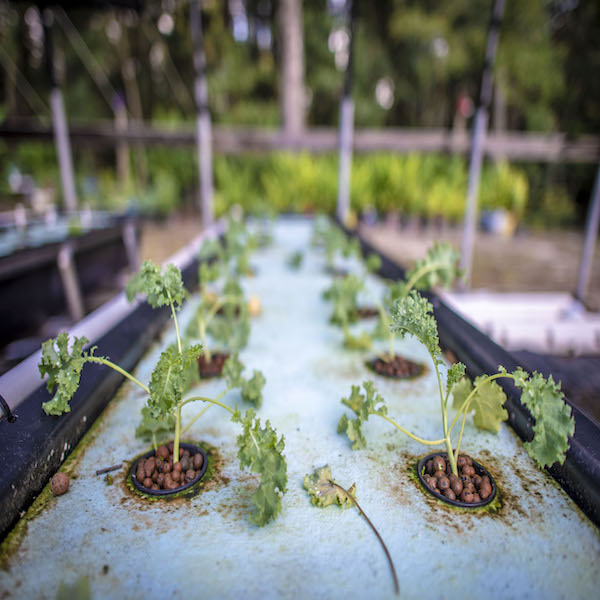What Are the Benefits of Aquaponics?
•Posted on January 12 2021

Aquaponics combines aquaculture and hydroponics (growing plants in water instead of soil) to cultivate vegetable crops.
Aquaponics relies on the nutrients produced by the interaction of freshwater fish and plants as they develop a symbiotic relationship in a controlled environment.
Involving a water system that constantly recirculates to propagate the nutrient exchange between plants and fish, aquaponics does not require pesticides or herbicides to artificially support plant growth.
What Are the Elements of an Aquaponic System?

An aquaponic system begins with obtaining a fish tank that accommodates the size of your garden.
Fish excrete waste containing nutrients beneficial to plant growth.
The species of freshwater fish populating your aquaponic system will determine what kind of food fish need.
For example, bass should be fed high protein pellets or flakes while carp can be feed insects and aquatic plants.
Additional components of a fully functioning aquaponic system include but are not limited to:
- Grow beds
- Water pump
- Plumbing fittings and pipes
- Optional sump tank
- Grow lights (for aquaponic gardens without access to adequate sunlight)
- Heating elements to maintain consistent temperatures
- Backup generator in the event of power outages
- Active carbon filtration system or other type of de-chlorination device
Green, leafy vegetables such as lettuce, spinach, okra, watercress, basil, and various herbs thrive in an aquaponic system due to moderate nutritional requirements.
Although they have higher nutritional needs than leafy vegetables, other plants like bell peppers, cucumbers, tomatoes and strawberries also grow well in an aquaponics garden.
What Are the Benefits of Aquaponics?

1. Organic and Nutritional Benefits
Nutritionally, food grown in an aquaponic garden is healthier, fresher and genuinely organic.
Plants and fish are not contaminated with pesticides or weed killers.
Everything used to cultivate vegetable and fruit-producing plants is natural and chemical-free, including fertilizers formulated to improve the overall operation of an aquaponic system.
2. Food is Grown All Year Round

With the ability to regulate temperatures throughout the year, aquaponics farmers do not have to depend on weather conditions to cultivate organic food.
3. Reduces Water Usage
Compared to backyard gardens and commercial farms, water waste is significantly minimized.
Since water used for sustaining an aquaponics system is constantly recycled and reused, there is no need to rely on additional water to support plant and fish growth.
4. No Soil, No Weeding

Some plants may occasionally give rise to unwanted sprouts that need removed but with no soil or atmospheric spread of seeds, weeding is nearly eliminated.
5. Accelerated Plant Growth
Plants naturally grow faster when they have access to rich amounts of nutrients and natural fertilizers 24 hours a day.
A constantly regulated water source also enhances plant growth.
6. Two Incomes for Commercial Aquaponics Farmers
Larger aquaponics operations can enjoy two sources of income: the vegetables and fruit they grow and the fish that can also be sold to food manufacturers.
7. Reduces the Planet's Carbon Footprint

Acres of farmland are not needed to cultivate aquaponics crops.
In fact, sustaining an aquaponic system is a viable alternative in places where the land is rocky, unstable, nutrient-poor or prone to drought.
8. Supports a Self-Sufficient Way of Living
Living off the grid is an increasingly popular lifestyle many people are adopting due to economic instability and rising food prices.
A completely self-sufficient lifestyle that includes solar power, well water resources and growing livestock would benefit substantially from an aquaponics system of cultivating food.
Grow With Greenway!

Contact us today to learn more about starting your own aquaponics system and what kind of fertilizers work best to improve plant growth.
You can shop some of these below.
Related Posts:
Comments
1 Comments
-

Posted by Jonathan | June 14, 2022
Leave a CommentGreat post! I also believe aquaponics can go one step further. It’s a fantastic opportunity to reconnect with nature.
This concept is illustrated with the “Holistic Aquaponics”. Here is an interesting representation of this concept:
https://youtu.be/LP8fay-8J3A
Keep up the good work :)